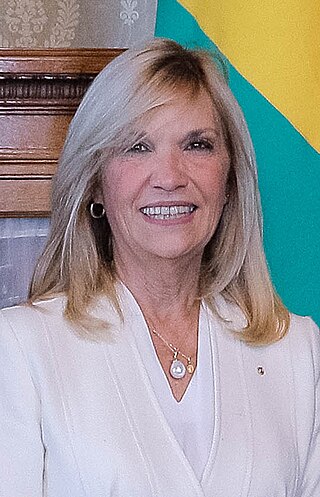 |
|---|
Parliamentary elections were held in Uruguay on 27 November 1913 to elect all members of the Chamber of Representatives. [1]
 |
|---|
Parliamentary elections were held in Uruguay on 27 November 1913 to elect all members of the Chamber of Representatives. [1]
Suffrage was limited to literate men. Voting was not secret, as voters had to sign their ballot paper. [2]
| Party | Votes | % | Seats | +/– | |
|---|---|---|---|---|---|
| Colorado Party | 32,742 | 59.59 | 76 | –9 | |
| National Party | 14,792 | 26.92 | 17 | New | |
| Anti-Collegiate | 5,269 | 9.59 | 0 | New | |
| Coalition | 843 | 1.53 | 2 | New | |
| Socialist Party | 793 | 1.44 | 0 | –5 | |
| Civic Union | 510 | 0.93 | 0 | 0 | |
| Total | 54,949 | 100.00 | 95 | +5 | |
| Source: Bottinelli et al. [1] | |||||

Uruguay, officially the Oriental Republic of Uruguay, is a country in South America. It shares borders with Argentina to its west and southwest and Brazil to its north and northeast, while bordering the Río de la Plata to the south and the Atlantic Ocean to the southeast. It is part of the Southern Cone region of South America. Uruguay covers an area of approximately 176,215 square kilometres (68,037 sq mi). It has a population of around 3.4 million, of whom nearly 2 million live in the metropolitan area of its capital and largest city, Montevideo.
The history of Uruguay comprises different periods: the pre-Columbian time or early history, the Colonial Period (1516–1811), the Period of Nation-Building (1811–1830), and the history of Uruguay as an independent country (1830–present).

The Colorado Party is a liberal political party in Uruguay.

Luis Alberto Lacalle de Herrera,, is a Uruguayan politician and lawyer who served as the 36th president of Uruguay from 1990 to 1995. A member of the National Party, he previously served as National Representative from 1972 to 1973, and as Senator of the Republic from 1985 to 1990.

The National Party also known as the White Party, is a major political party in Uruguay. Founded in 1836 by General Manuel Oribe, it is the country's oldest active political party, and along with the Colorado Party, its origin dates back to the establishment of Uruguay as an independent state.

The Socialist Party of Uruguay is a socialist political party in Uruguay. Founded in 1910, it is part of the Broad Front political coalition and the Progressive Alliance.

The Broad Front is a left-wing political coalition in Uruguay. It was the ruling party of Uruguay from 2005 to 2020 and has produced two presidents: José Mujica (2010–2015) and Tabaré Vázquez. Since 1999, it has been the largest party in Uruguay's General Assembly.

The vice president of Uruguay is the person with the second highest position in the executive branch of the Uruguayan government, after the President of Uruguay. The Vice President replaces the elected President in case of his death or absence. The vice president is also an officer in the legislative branch, as president of the Chamber of Senators and of the General Assembly.

The Chamber of Representatives is the lower house of the General Assembly of Uruguay. The Chamber has 99 members, elected for a five-year term by proportional representation with at least two members per department.

The General Assembly of Uruguay or parliament is the legislative branch of the government of Uruguay, and consists of two chambers: the Chamber of Senators and the Chamber of Representatives. General Assembly has 130 voting members: 99 representatives and 30 senators, the Vice President of the Republic, who serves as President of the General Assembly, and the Senate has the right to vote. The legislature meets in the Legislative Palace in Montevideo. Both senators and representatives are chosen through proportional representation for five-year terms.

Luis Alberto Aparicio Alejandro Lacalle Pou, is a Uruguayan politician and lawyer, serving as the 42nd president of Uruguay since 2020.

The Electoral Court of Uruguay is the autonomous body which oversees the implementation of electioneering process, such as elections, referendums on laws and constitutional plebiscites in the Oriental Republic of Uruguay.

The president of Uruguay, officially known as the president of the Oriental Republic of Uruguay, is the head of state and head of government of Uruguay. The president presides over the Council of Ministers, directing the executive branch of the national government, and is the commander-in-chief of the Armed Forces of Uruguay.

General elections were held in Uruguay on 28 March 1938. The result was a victory for the Colorado Party, which won a majority of seats in the Chamber of Representatives and received the most votes in the presidential election, in which the Alfredo Baldomir faction emerged as the largest. Baldomir subsequently became President on 19 June.

The Intransigent Radical Ecologist Party is a Uruguayan green party established in 2013.

General elections were held in Uruguay on Sunday, 27 October 2019 to elect the President and General Assembly. As no presidential candidate received a majority in the first round of voting, a runoff election took place on 24 November.

The Green Animalist Party is a Uruguayan conservative green party established in 2018, which places a particular emphasis on animal rights.

Parliamentary elections were held in Uruguay on 28 November 1910 to elect all members of the Chamber of Representatives and 7 of the 19 members of the Senate. The main opposition, the National Party did not contest the elections.